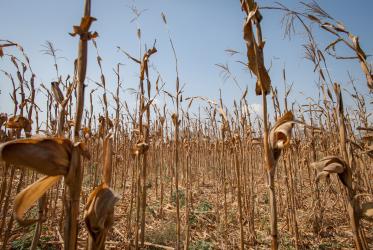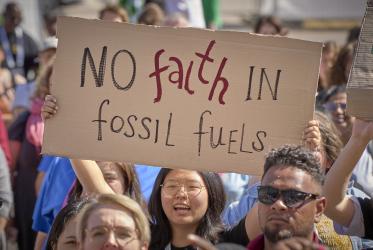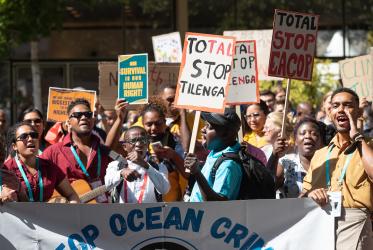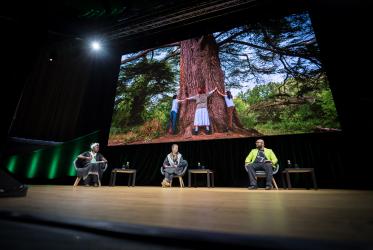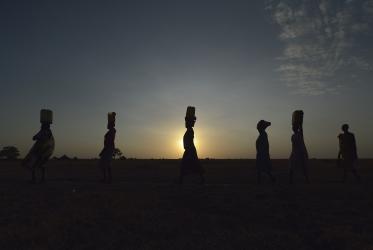A prayer for Creation Day and Time for Creation:
Help Pilgrims of Justice and Peace to denounce first the prevailing limitless greed which is the root cause of pseudo-ethics against Creation.
Twenty-six years after the late Ecumenical Patriarch Dimitrios I first proclaimed September 1st as a day of prayer for the environment, Creation is facing an ever more threatening future. I see the daily crying of Creation and the continuous mourning of God’s suffering people: immigrants who have fled from terrorism, orphans of war, refugees from flooding, suicides caused by bankruptcy, children dying from poverty and from hunger,… perhaps like the old “Time of Destruction” in Sodom and Gomorra (Gen. 19).
The Orthodox Church year starts on September 1st with a commemoration of how God created the world: very good (Gen. 1:31) and sustainable – so as to use the most fashionable term of the 21st century. The question for us now is whether to sustain “Time for Creation” or “Time for Destruction”?
Of course no-one would choose destruction unless he/she is unaware of what they are heading for, or, even worse, is totally confused so as to opt for death over life (Isaiah 5:20: “Woe to those who call evil good and good evil, who put darkness for light and light for darkness, who put bitter for sweet and sweet for bitter!”)
Creation is comparable to a living tree nourished by an underground water source. Water is beneficial for the life of the tree if it is used with moderation, but it becomes destructive when in excess (greed).
Greed is the greatest of all plagues against the sustainability of the Creation. Environmental problems are the results of irrational use of resources and overconsumption in many ways (pollution, poverty, loss of biodiversity, climate change, war, etc.). The globalized monetary economies rely on structural greed that promotes unlimited accumulation of wealth, overconsumption and individualistic competitive behavior.
Creation is sustained only in community (peace) and in equity (justice). Without “sustainable” care for Creation, there won’t be justice or peace, so pilgrims of justice and peace should first of all denounce greed and choose to care for Creation as first step in their journey.
The pilgrimage of justice and peace is not genuine unless everything is set with respect to the holiness of Creation. Pilgrims of justice and peace would err if they don’t start with prayers for Creation as the compass for their trip.
Pilgrims of justice and peace will not reach their destination if they don’t bear testimony by adopting a greedless life-style during their mission. In a world where everything is measured by monetary units and human evaluations of wealth, the care for Creation should not remain a void philosophical or outward cultural life-style but a manifestation of the inner life sharing acts of ministry towards the Creator.
A human being is like grass which blooms and passes away. However God chose the human being to be the manager of his Creation and therefore eternally bear His image, His justice and His peace.
Life is not about materialistic possessions but diversity and spiritual coexistence with others and with God, the Creator. Jesus Christ warned us to “take care to guard against all greed, for though one may be rich, one’s life does not consist of possessions” (Luke 12:15).
Gandhi is said to have summarized the problem very well: The Earth provides enough for everyone's need, but not enough for everyone's greed.
Pseudo-environmental ethics lead only to death and environmental crisis (climate change, biodiversity loss, poverty, war, pollution, suicides, terrorism, indifference, etc.).
Time of Creation can only truly begin with “metanoia” (repentance) and living by the truth which is “Love”. God is Love (1 John 4:8).
Love makes us to seek for the peace and justice in every corner of the Earth. Now pilgrims of justice and peace should determine what is to be the limit of poverty or of wealth.
Without pragmatic limits to greed, there won’t be justice and peace. Churches and religious people have to raise their voice to proclaim the truth on greed and bear testimony for the right way to “sustain” Creation.
Pilgrims of justice and peace should reflect on deeper questions on how to avert human distortions resulting from compelling structural greed and pseudo- environmental ethics.
Let us continuously pray for open “spiritual” eyes and see our urgent ministry in sustaining the Creation and in changing our lives according to the holy Words of the Creator (2 Timothy 3:1-5). Amen!



